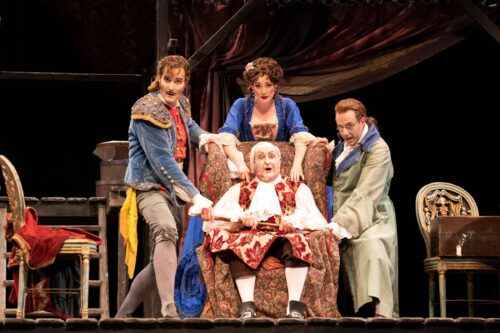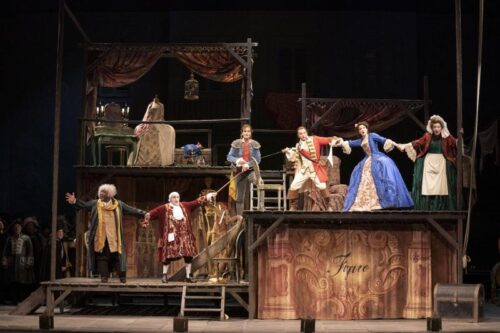 United Kingdom Rossini, The Barber of Seville: Soloists, Chorus and Orchestra of Welsh National Opera / Frederick Brown (conductor). Wales Millennium Centre, Cardiff, 29.9.2021. (GPu)
United Kingdom Rossini, The Barber of Seville: Soloists, Chorus and Orchestra of Welsh National Opera / Frederick Brown (conductor). Wales Millennium Centre, Cardiff, 29.9.2021. (GPu)

Production:
Director – Giles Havergal
Staff director – Sarah Crisp
Designer – Russell Craig
Lighting designer – Davy Cunningham
Chorus Master – Dave Doidge
Cast:
Figaro – Nicholas Lester
Count Almaviva – Nico Damanin
Rosina – Heather Lowe
Doctor Bartolo – Andrew Shore
Berta – Angharad Morgan
Basilio – Keel Watson
Fiorello – Howard Kirk
Ambrogio – Simon Crosby Buttle
Policeman – Michael Clifton-Thompson
Notary – Alastair Moore
Welsh National Opera’s 75th anniversary – and first post-Covid – season consisted, for obvious reasons, of just two operas this autumn, Madam Butterfly (review click here) and The Barber of Seville. Although the two works fundamentally represent opposite poles in the operatic world, they also have a few things in common. Both are amongst the most popular and most frequently produced operas in the modern world. Yet both had disastrous first nights. Puccini’s opera when premiered, with a fine cast, at La Scala in February 1904, received a generally rowdy response; there was, for whatever reason, a hostile atmosphere in the house. Hecklers and whistlers tried to disrupt Act I, while ‘Un bel dì’ was received with a studiedly apathetic silence. During Act II some members of the audience chose to produce raucous animal noises. The next day’s newspapers carried headlines like ‘Puccini hissed’ and ‘Fiasco at La Scala’. Puccini chose to withdraw the opera after this single performance and went on to revise the work. Rossini’s now famous opera also had a first-rate cast when premiered at the Torre Argentina in Rome in February 1816, but it, too, had a very unhappy first night. (February seems to have been an ill-starred month for both operas). There were unfortunate mishaps – unless they were maliciously contrived – which drew mocking laughter from the audience: the singer taking the role of Don Basilio tripped and fell in the wings and had to sing the famous ‘Calumny’ aria with a bleeding nose; he got no sympathy from the audience. Nor did Manuel Garcia (as the Count) when, as he sang his serenade, a guitar string snapped loudly. During the opera’s complex finale a cat found its way onto the stage and wandered among the singers (having also put in an appearance in Act I). Apparently there were times when the music was almost inaudible. Some, at least, of this disruption was not casual or spontaneous.
There had been several earlier operatic versions of Pierre Beaumarchais’s play. The most enduringly popular was the 1782 work by Giovanni Paisiello. It seems very likely that admirers of Paisiello, feeling that it was presumptuous of the 24-year-old composer to ‘challenge’ their hero in this direct fashion, were eager to disrupt the new Barber. Interestingly, Leigh Hunt – writing in The Examiner in March 1818 – on the occasion of Rossini’s work being performed for the first time in England – expressed (more politely) sentiments akin to those which may have motivated some of the first night protesters: ‘We were among those who thought that the author’s [sic] having taken up an opera to set to music, which had been already composed by so fine a master as Paisiello, was not a piece of ambition in the best taste …’. Rossini refused to be cowed by the original protests and the work’s popularity soon grew. Whether or not the young Rossini deliberately set out to outdo Paisiello, the simple fact is that his Barber soon totally eclipsed the earlier version.
In one or two other respects Madam Butterfly and The Barber of Seville show some similarities. In both, for example, all the action happens in and around a single house. But, of course, they are, at a profounder level, very different. They might be thought of, indeed, as opera’s equivalents of the theatrical masks of Tragedy and Comedy. In tragedy the young (think of Romeo and Juliet) are frequently the victims of their elders’ failures, as parents or as representatives of society’s dominant values; so Cio-Cio-San is destroyed by forces yet more powerful than the quarrels of the Montagues and Capulets. In comedy the young usually triumph over the obstacles the old put in their way; Rosina and Almaviva defeat (with the assistance of Figaro, a version of the clever servant so common in Roman comedy) Dr Bartolo and Don Basilio.
I should confess that I prefer my Rossini in Italian rather than English. Not because I speak Italian fluently (I don’t) but because Rossini’s music complements the rhythms and patterns of spoken Italian far more comfortably than those of English. But if we are to have Il barbiere di Siviglia in English, Robert David MacDonald’s version is the one I would settle for. Its wit, especially in the use of rhyme and allusion, is often so precisely pointed that for a moment one forgets that Rossini wasn’t setting this particular text. It probably helped too that several members of the cast, such as Nicholas Lester (Figaro), Nico Damanin (Count Almaviva) and Andrew Shore (Bartolo) were all repeating roles they had sung in earlier iterations of this production and probably benefitted from the singer’s equivalent of the tennis player’s muscle memory.
Some, I know have doubted the wisdom of reviving a production first mounted (in the New Theatre in Cardiff) as long ago as May 1986. When, a week or two ago, a friend asked me why the WNO were not presenting a new production, my initial answer was that given that the financial hit the WNO had doubtless suffered through the effects of the pandemic, it would make sense to revive a production rather than preparing two new productions. Now I would add a second and more important answer – It still works well! I have reviewed Giles Havergal’s production twice before (if my memory is accurate) and I saw it at least once before I started reviewing. But I am not weary of it. With an energetic and professional cast – which it had on this occasion – it can still provide a forceful affirmation of the lasting importance of the comic spirit.

The central conceit of the production is the use of a scaffold-stage, with a kind of onstage audience watching the action on and around that stage, while we see them watching, at the same time that we watch what they are watching. This self-conscious theatricality very largely avoids the kind of tweeness into which such a device can easily descend. The self-referentiality of MacDonald’s text contributes a good deal here, as in its allusion to Shakespeare’s Puck, being entirely at home alongside the many references to the conventions and history of opera present in the libretto which Cesare Sterbini prepared for Rossini. Not for the first time I treasured the moment when, during her music lesson, Shore, as Bartolo, dismisses the modern music Rosina likes, declaring his preference for that of the old days, declaring that ‘La musica a’ miei tempi era altra cosa’ (‘In my day music was quite another thing’) – MacDonald rephrases this as follows, ‘When opera was opera and men were sopranos’ – and Bartolo tries to make his point by singing an aria associated with the famous castrato Caffarelli, but can only produce a miserable frog-like croaking sound.
This production may now be in the vintage class, but it still functions like a well-oiled comic machine. Havergal, now in his eighties, oversaw this latest revival of his original production. It benefits from what the cast bring to it, not least mezzo-soprano Heather Lowe as Rosina, very impressive vocally, in terms of range, precision and expressiveness alike. Her Rosina was pert and self-confident with a nice line in deceptiveness and a very believable determination to get her own way. As Figaro, Lester was full of energy, but though generally sound in vocal terms had more moments when he struggled to sustain the momentum of Rossini’s music than I remember his having when I last heard him in the role. As the Count, Damanin fitted perfectly into the production, though vocally I found his performance pleasant rather than particularly revelatory or memorable. Shore’s Bartolo is certainly a memorable creation, beautifully characterised (not, of course, in inappropriately naturalistic fashion, but in the tradition of the commedia dell’arte) and very decently sung. Howard Kirk’s Fiorello captured the pomposity of the character well, and vocally did not let the side down. I use the word ‘side’ purposely, for this is a production which puts the emphasis on teamwork rather than individual brilliance. Even a relatively minor character such as the maid Berta, a role taken here by Angharad Morgan, fits into the larger design. Morgan acquitted herself well, especially in her one moment in the spotlight in Act II – the aria which, in the original begins ‘Che vecchio sospettoso’. Keel Watson, as Basilio, I found rather heavy-handed, perhaps not quite at home in the comic idiom of the production.
The orchestra, conducted by Frederick Brown (a new name to me; after working as a répétiteur in Hamburg, he joined WNO in 2018) made an assured contribution throughout, though one has certainly heard the orchestral music of this opera pack more sheer fizz on other occasions.
But it would be wrong to end this review on a note of disappointment. Under circumstances which remain difficult for the preparation and rehearsal of any opera, this revival was an engaging response to the miseries and difficulties of the last couple of years, a statement of comedy’s belief in the resilience of the human spirit and the hope embodied in the energetic desires of the young.
Glyn Pursglove

I enjoyed the evening so much. The singers who stood out for me (for their acting as well) were Heather Lowe and Andrew Shore. I thought that Almaviva and Figaro were rather disappointing by comparison; I loved the production and the translation worked well although I could see that English, any English, was not going to keep up with the Italian – thank goodness for the surtitles! Thanks to the wonderful Welsh National Opera – it was a stunning night out!